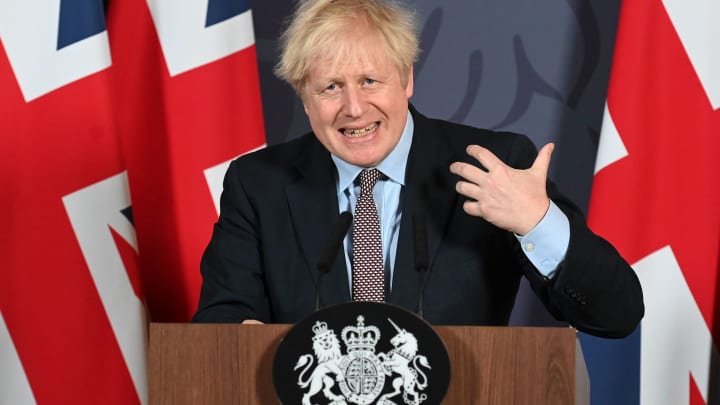After months of deadlock and negotiations, leaders of the United Kingdom and the European Union have arrived at a free trade deal to govern the post-Brexit relationship between the two. The deal finalized and announced on Thursday, December 24, will now have to be ratified not only by the British Parliament, but also by all the 27 member nations of the EU and the European Parliament, before December 31 to avoid major trade uncertainty.
Although the UK formally exited the EU in January this year, the Brexit process was not complete as a trade deal between the two was yet to be arrived at. Trade relations and movement of people is currently governed by the transitional provisions in the exit deal that is set to expire on December 31. With the deadline less than a week away, the two sides are working overnight to get the deal pushed through.
The volume of trade between the UK and the EU comes close to over USD 900 billion as of 2019. This translates to nearly 48.9% of the UK’s international trade and nearly 12.6% of the EU’s.
Even though the new deal will provide for a tariff-free and quota-free trade between the two, it will add more barriers than what they are used to. Free movement of goods, services and people will all come to an end with the beginning of 2021. Citizens from both sides will no longer hold the right to move, settle and do business, while businesses will have to start taking up measures to deal with the bureaucracy of two separate regulatory and legal entities.
British prime minister Boris Johnson struck a jubilant note while announcing the deal. As a long time opponent of the UK’s membership in the EU, right from his days as a journalist when he was known to push factually incorrect claims about EU regulations as news, the deal comes as a victory. The deal will allow the conservative government to make or amend regulations on quality, competition, labor rights and environment, independent from the EU
The Irish question though, will continue to remain the biggest point of contention for the UK-EU relations. With special arrangements made for Northern Ireland to effectively remain in the EU single market for goods, thanks to the withdrawal agreement, the UK is yet to get a clean withdrawal. Recently, the Johnson government tried to undo parts of this provision, through a bill on the internal market, but dropped the attempt after facing defeat in the House of Lords.
The separate arrangement for Ireland is already causing discontent in Scotland, where the majority voted against Brexit in the 2016 referendum. Scottish first minister and leader of the Scottish National Party, Nicola Sturgeon, in a tweet, stated that “it’s worth remembering that Brexit is happening against Scotland’s will” and added that it is time for Scotland’s future as “as an independent, European nation.” Sturgeon has been pushing for a second independence referendum in Scotland to counter the UK’s exit from the EU.
Before the spin starts, it’s worth remembering that Brexit is happening against Scotland’s will. And there is no deal that will ever make up for what Brexit takes away from us. It’s time to chart our own future as an independent, European nation.
— Nicola Sturgeon (@NicolaSturgeon) December 24, 2020





